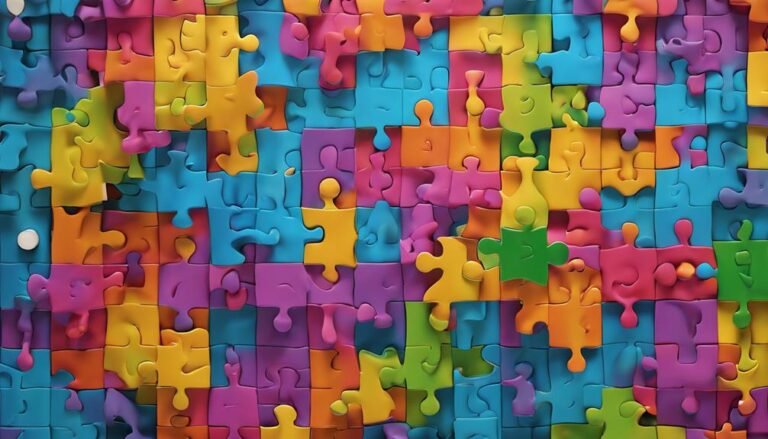Factors Influencing Personality Development: An Overview
You might not realize that your personality is a culmination of various intricate elements that have shaped who you are today. From the subtle influence of your genes to the profound impact of your environment, numerous factors intertwine to mold your unique traits. As you navigate through the complexities of personality development, understanding these underlying forces can offer valuable insights into the intricate tapestry that forms the essence of who you are.
Key Takeaways
- Genetic predispositions play a significant role in shaping personality traits.
- Environmental factors, like peer pressure and societal norms, influence personality development.
- Upbringing and childhood experiences, including parental influence, impact personality.
- Relationships, social interactions, and emotional bonds contribute to personality formation.
- Cultural norms, values, and identity shape personality expression and behaviors.
Genetic Predispositions
Genetic predispositions play an important role in shaping an individual's personality traits and characteristics from an early age. The age-old debate of nature vs. nurture revolves around the notion of how much of one's personality is inherited through genetics versus influenced by environmental factors.
Inherited traits, stemming from your genetic makeup, lay the groundwork for various aspects of your personality. These traits can include temperament, levels of neuroticism, extroversion, and even predispositions towards certain behaviors.
Research has shown that genetic factors contribute significantly to the development of an individual's personality. For instance, studies on twins separated at birth have highlighted the undeniable influence of genetics on personality traits.
This genetic predisposition sets the stage for how you may respond to external stimuli and shape your tendencies towards certain behaviors. Understanding the interplay between inherited traits and environmental influences is important in comprehending the complexity of personality development.
Environmental Influences
Environmental factors play a significant role in shaping your personality development. One important aspect of environmental influence is peer pressure, where individuals are influenced by the behaviors and attitudes of those around them. This can impact your personality by shaping your preferences, values, and decision-making processes.
For example, if your peers value academic success, you may be more inclined to prioritize your studies and develop a hardworking personality trait.
Moreover, societal norms also play a key role in influencing your personality development. Society sets expectations for how individuals should behave, dress, and interact with others. Adhering to these norms can shape your personality by influencing your beliefs, attitudes, and social behaviors.
For instance, if societal norms dictate that being polite and respectful is important, you may develop a courteous and considerate personality.
Upbringing and Childhood Experiences
The foundation of your personality development is intricately woven with your upbringing and childhood experiences. Parental influence plays an essential role in shaping your personality. Your interactions with your parents during early childhood can greatly impact your self-esteem, emotional regulation, and social skills.
Positive parental support and guidance can foster a sense of security and confidence, leading to a more positive outlook on life. Conversely, negative or inconsistent parenting styles may result in feelings of insecurity, anxiety, or difficulty in forming healthy relationships.
Family dynamics also play an important role in your personality development. The way conflicts are resolved, communication patterns, and the level of cohesion within the family unit can all influence how you perceive yourself and others.
Early experiences, such as attachment to caregivers, exposure to different cultures, and traumatic events, can leave lasting imprints on your personality. These experiences shape your beliefs, values, and attitudes towards the world around you, ultimately influencing your behavior and relationships in adulthood.
Role of Relationships
Your relationships with others play a significant role in shaping your personality and overall development. Social interactions and personal connections form the foundation of these relationships, providing opportunities for growth and self-discovery.
Emotional bonds established with family, friends, and peers contribute to your sense of identity and emotional well-being. The quality of these relationships influences your self-esteem, confidence, and ability to navigate the complexities of social dynamics.
Communication skills are essential in fostering healthy relationships and are key in expressing thoughts, feelings, and needs effectively. Through interactions with others, you learn to listen actively, empathize, and resolve conflicts constructively.
These skills not only enhance the quality of your relationships but also impact how you perceive yourself and the world around you.
Impact of Culture
Culture greatly shapes and influences individual beliefs, behaviors, and values, playing a pivotal role in the development of one's personality. Cultural norms, which are the unwritten rules that govern behavior within a specific culture, heavily impact how individuals interact with others and perceive the world around them.
Through socialization, the process by which individuals learn and internalize the values, norms, and behaviors of their culture, individuals develop a set of guidelines that shape their personality.
Cultural identity, the feeling of belonging to a particular cultural group, influences how individuals express themselves and interact with others. Self-expression is often guided by cultural norms and values, leading individuals to communicate and behave in ways that are deemed acceptable within their cultural context. This can include language use, communication styles, and even non-verbal cues that are specific to a particular culture.
Educational Background
Your educational background plays a vital role in shaping your personality.
The impact of education on personality development is significant, as it influences your values, beliefs, and worldview.
The learning environment you're exposed to also affects how you perceive yourself and others.
Impact of Education
The educational background of an individual plays a significant role in shaping their personality development. Academic performance is often linked to self-esteem and confidence, impacting how a person perceives themselves and interacts with others. Success in education can foster a sense of achievement and competence, which may translate into a more assertive and outgoing personality.
Additionally, social interactions within an educational setting contribute to the development of communication skills, empathy, and conflict resolution abilities, all of which are vital aspects of personality.
Cognitive development is also influenced by education, as it enhances critical thinking, problem-solving skills, and decision-making processes. Individuals with a strong educational background tend to exhibit higher levels of emotional intelligence, being more adept at understanding and managing their emotions as well as those of others. This emotional maturity can lead to greater resilience, adaptability, and overall emotional well-being.
As such, one's education not only shapes their intellect but also plays a fundamental role in molding their personality.
Learning Environment Effects
The learning environment in which you're immersed during your educational background greatly influences your personality development. Social interactions within the school setting play an important role in shaping your interpersonal skills and communication style. These interactions with peers, teachers, and other school staff members can impact your self-confidence, empathy, and ability to work collaboratively with others. Additionally, the academic performance expectations set within the learning environment can influence your work ethic, determination, and resilience in the face of challenges.
Peer influence also plays a significant role in shaping your personality during your educational background. The dynamics within the classroom, including group projects, discussions, and social activities, can influence your decision-making skills, leadership abilities, and conflict resolution strategies. The ways in which you navigate these peer interactions can have long-lasting effects on your social skills and emotional intelligence.
As a result, the learning environment during your educational background is a critical factor in your overall personality development.
Traumatic Events
Experiencing traumatic events can have a significant impact on your personality development. Coping mechanisms and emotional resilience play vital roles in how individuals navigate the aftermath of such events.
Trauma can lead to the development of post-traumatic stress disorder (PTSD), where triggers associated with the traumatic event can evoke intense emotional and physical reactions. Seeking therapy options like cognitive-behavioral therapy or exposure therapy can aid in processing the trauma and reducing the impact it has on your personality.
Individuals may develop various coping mechanisms to deal with the effects of traumatic events, such as avoidance behaviors, emotional numbing, or hypervigilance. These coping strategies can shape your personality by influencing your responses to future challenges and interactions.
Emotional resilience, the ability to adapt and bounce back from adversity, also plays a significant role in how trauma affects your personality development. Building emotional resilience through therapy or support networks can help mitigate the long-term impact of traumatic events on your personality.
Personal Choices and Goals
Steering personal choices and goals plays a pivotal role in shaping your personality development. Your decisions and aspirations directly impact your personal growth and overall character.
When you actively engage in goal setting, you're laying the foundation for self-improvement and development. Setting realistic and achievable goals not only provides a sense of direction but also fosters a sense of accomplishment when these goals are met. This sense of achievement contributes immensely to your self-esteem and confidence, which are essential aspects of personality development.
Moreover, personal choices reflect your values, priorities, and beliefs, influencing how others perceive you and how you interact with the world around you. By making thoughtful decisions that align with your core values, you're actively shaping your personality and character.
These choices serve as a reflection of your identity and contribute to your overall growth as an individual. Hence, being mindful of the choices you make and the goals you set is critical in fostering a positive and enriching personality development journey.
Conclusion
As you reflect on the myriad factors that shape your personality, remember that you're a canvas painted with strokes of genetic predispositions, environmental influences, and personal choices.
Like a tapestry woven with threads of upbringing, relationships, culture, and experiences, your personality is a unique masterpiece that evolves over time.
Embrace the complexity of your personality development, for it's a rich tapestry that reflects the intricate interplay of nature and nurture.






